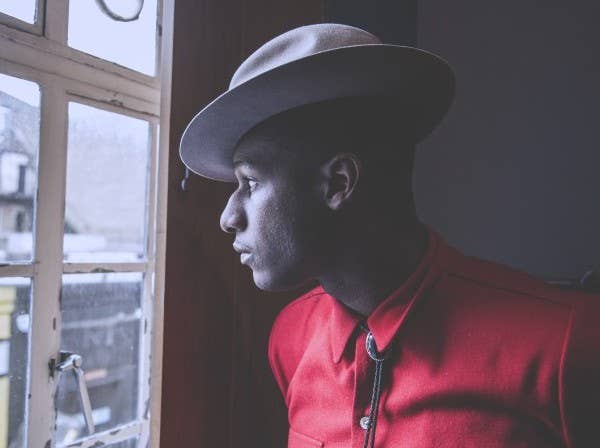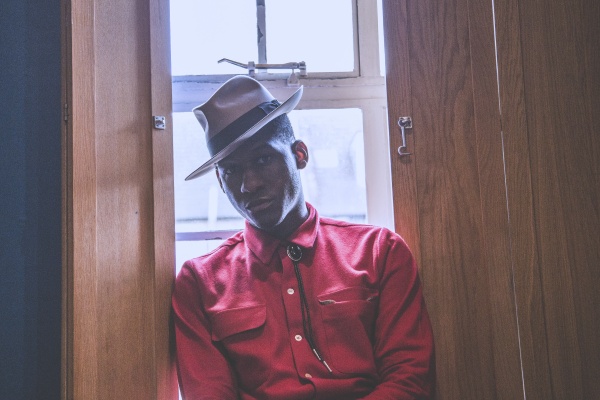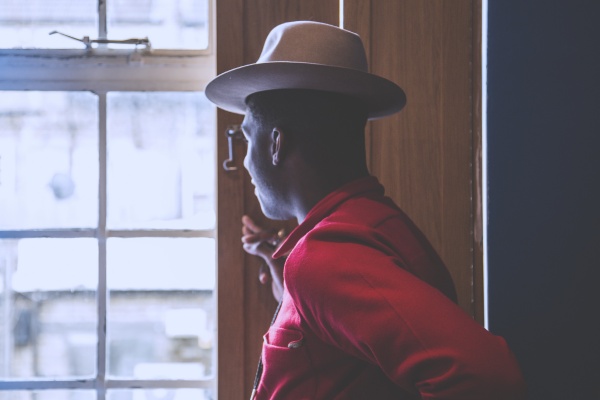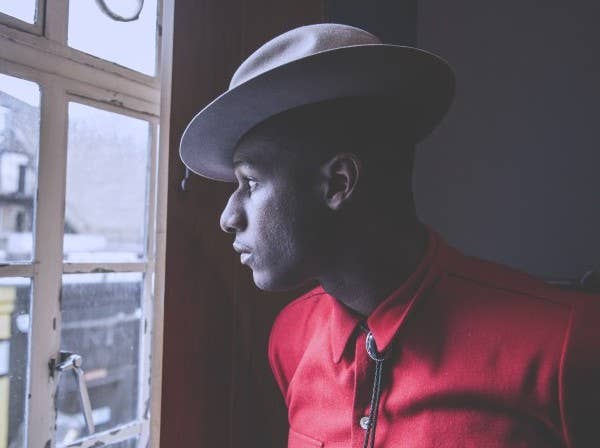1.

Image via Jack Greenwood
By Jimmy Ness
It’s easy to be skeptical about Leon Bridges. His manicured suits, vintage hairstyle, and velvet tones seem constructed for those fascinated with yesteryear. The Sam Cooke comparisons are relentless. Within two years of signing to Columbia Records, the 26-year-old soared from open mics in Fort Worth, Texas to performing for the Obamas. He’s already shared stages with Paul McCartney, Stevie Wonder, and Lionel Richie. But Leon’s not a manufactured novelty. He acknowledges the sudden rise and frequently pinches himself. “If I heard that from somebody else, I’d think the same thing, but people don’t know the story.”
Living in a biblical household and feeling isolated from his peers’ worldly interests set Bridges on an individual path. He retreated from socializing to daydreams of being an R&B star. Leon studied dance at community college and was more inspired by Usher’s body popping than the soul era. While working two jobs, he learned a few guitar chords and started performing in North Texas bars. Playing under the suitable guise of “Lost Child,” Bridges flirted with singing over hip-hop, neo soul, and R&B.
His creative breakthrough came with writing maternal dedication “Lisa Sawyer.” Friends assumed the heartfelt ode was nostalgic and pushed him to investigate the style he’d stumbled upon. Leon completed the aesthetic when a senior family friend gave away some bygone clothing, and he started donning the garments at shows. Local musicians Austin Jenkins and Joshua Block noticed his old world get-up first, but Bridges’ music was undeniable. The trio quickly produced two popular demos on analog equipment, including their debut album’s title track “Coming Home.”
Before thrilling an expectant London crowd at the O2 Brixton, Leon met us in a starkly lit backroom for some quick photos and reflective discussion. He expressed not wanting to hide his tastes for conservative fans, defending Young Thug, and why Ginuwine’s The Life was his first album. We also discussed why largely white audiences gravitate to his sound, the political side of soul, and the influence of civil rights on his life. Throughout the interview, Leon conveyed a genuine appreciation of modern and classic sounds, and their dual influence on his unfeigned melodies.
Is being called a “retro act” limiting?
I mean, yeah it can be limiting. When you do something that’s very specific, like the arrangement or whatever, you can label it. People can easily label it as retro. I’m all about song writing, so you can take my songs and easily put it in a country song or put it in a rock song. I look at “retro” as me singing, “I’m going to the diner, and I’m going to get my ’64 Cadillac.” I’m talking about true stories and real things. It’s not some fantasy world out there.
It’s a timeless theme.
Exactly.
How do you innovate in a genre that’s so indebted to the classics?
Man, you know, just really being me. It’s going to come out naturally because if I try to recreate retro music or classic soul music or whatever, it might come off as gimmicky. I grew up on Ginuwine and Usher, and I like country and folk music. Whenever I look at it, I can consume this classic R&B and country music and all that type of stuff and whatever way it comes out, it’s going to come out fresh based on my influences.
Are there clichés of a soul singer that you’re trying to avoid?
Of course, people are going to look my music and they might hear one song and be totally turned off. In this day and age, there are a lot of people who are pretty skeptical. You see a lot of crazy, cliché type of stuff.
3.

Image via Jack Greenwood
Why were you drawn to R&B?
It was just a feeling, there was something about the melodies and the vocal style that spoke to me more than what rap did. Another thing is that I wasn’t able to listen to rap growing up and you know, I heard it on the radio coming up like, “Oh that’s cool that’s catchy,” but you know, me being a singer as well too, I was just more drawn to R&B and the idea of being in an R&B group. I used to always fantasize about it.
How do you make soul music relevant in 2016? Would you ever cover political themes like Curtis Mayfield did in his time?
In reality, based on what’s popular, I’m being political just by wearing this suit as my daily thing. I’m being political not having sexually orientated songs, when that’s the norm. I feel that everything I talk about is stuff that people can relate to. I do feel when an artist has a platform he should use that platform to speak truth and that’s the direction that I’ve really been moving on. When I wrote these songs, the Black Lives Matter movement wasn’t even prevalent within the media, this is like three or four years ago.
So now that I’ve grown a lot, I see an open door to speak on things. I’m not moved just because people say, “Oh you should do this because you’re a retro act and Sam Cooke or Marvin Gaye did it.” It’s about how I feel about the situation.
I’m being political just by wearing this suit as my daily thing. I’m being political not having sexually orientated songs, when that’s the norm.
It’s interesting you enjoy R&B and rap, but some of your fan-base thinks “music was better before it went commercial.” You don’t pretend to only like older music on social media to appease those people.
Definitely, it’s like, I love classic music and that’s the type of art I make, but I can’t front. There’s a lot of people, who live this fantasy world with pin-up girls, who want to be Marilyn Monroe and use all of this classic lingo and whatever, but it’s just not me. It’s all about being real and honest all of the time. I don’t shy away from that just because I have a certain audience.
When you started making classic soul music, it was purely by accident.
Yeah, it’s funny because I was writing songs and I wasn’t thinking, “Oh this needs to be like Sam Cooke” or anything. I wrote “Lisa Sawyer” at the time and I just wanted to make a great song because my friends were writing great songs. I wanted to be able to not compete, but stay in the world with them and so yeah, I wasn’t really aware. It wasn’t until somebody brought it up and was like, “Are you inspired by Sam Cooke?” And I was like, “Oh wow, I need to go freakin’ listen to him because I’ve never really listened to his music.” Like I knew of him, I heard him when I was a kid, but I didn’t go out and buy records. After that I was like, “OK, I want to consciously make a decision to make this type of music in my own way.”
What’s your favorite music video with dancing scenes? I liked “U-Turn” and “You Don’t Have to Call.”
“U-Turn” was great. In high school, my go to video… I mean you just hit it “You Don’t Have To Call.” You could go with “So Anxious” by Ginuwine, or “Thong Song” by Sisqo. That stuff was so interesting to anticipate each video, like what kind of new dance move are they going to do? That dance culture was really big in high school, like ’04 and ’05, everybody was pop-locking and all of that kind of stuff, so that’s where I picked it up.
You’ve previously mentioned struggling with your identity in high school. Do you think you’ve overcome those insecurities?
Man, I feel like I’m away from it, just being in my career now and everything is cool. But I still feel like an outsider based on the music I make in this world. It’s like my music is not going to naturally draw a black audience. I feel that black people love it for the most part, but cultures change.
Why do you think soul music seems to draw more white people now?
It’s just the culture has changed. I think white people see that type of music and really cling to it and draw to it and really appreciate it. I feel that black people can look at it and be like, “Oh that’s cool, what he’s doing.” Me personally, I’d rather go to a Young Thug concert.
Me personally, I’d rather go to a Young Thug concert.
You once tweeted a quote from Kendrick Lamar. He said, “Hip-hop is all energies. James Brown can get on a track and mumble all day, but guess what: you felt his soul on those records.”
Exactly, and that’s the conversation I was having with my partners the other day. It was just like, of course, lyrically there’s no substance there really, but it’s all about that vibe. You can hate on Drake or whatever, but it’s the vibe. I just love the vibe that Future gives off, it’s a certain feeling. I can get on a song and talk about apple juice, but it’s all about the vibe at the end of the day. It’s about more than just lyrics. It’s about delivery. I feel there’s a time and place for everything.
Why was Ginuwine’s The Life your first album? I feel like not many dudes could say their first album was R&B.
I know, it’s crazy! I’m telling you, I was an R&B head. Me and my partners grew up on that type of stuff. One of my other partners, he used to play this song “A Tribute To A Woman.” I used to come over to his crib and he’d be in his room dancing to it. So I was like, “What is that?” I found out and it was like, “OK, that’s the album I’m going to get.” Then I leant it to him and I never saw it again, but yeah. My favorite singer/songwriter of all time is R. Kelly. I don’t know, he was just like so extreme, just everything like “When A Woman’s Fed Up,” there’s definitely hints of classic soul in there.
Who are your five favorite artists at the moment?
Right now, it is Kendrick Lamar, Anderson .Paak, BJ The Chicago Kid. I really like Ty Dolla Sign and Bryson Tiller.
You mention civil rights a lot on Instagram. Did you care about that when you were younger or did that come with getting into soul music?
I was very interested in it when I was young. My father, he would make it a priority to always educate me and my brother. We would watch documentaries, like he’d make us watch Heat In The Night, Sidney Poitier and stuff like that, and I was always fascinated with some of the civil rights movement. When I was a kid, I had printed out a picture of those three guys who went out and got killed. It was a black dude and two white guys. I printed it out and put it on a shirt and I would wear that in high school, just stuff like that. It’s something that when I started with soul music, it has always been there.
8.

Image via Jack Greenwood

